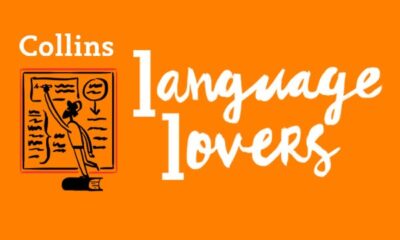Word-lovers abound in the Collins Dictionary community, and so we’ve kicked off an interview series with some of the ones we’re lucky enough to count as friends of the blog.
Following our interview with Lynne Murphy of Separated By A Common Language, we’re delighted to speak to Tim Gorichanaz from ScratchTap, featuring his thoughts and research on written communication on the Internet.
You can read Tim’s blog at www.scratchtap.com, you can find him on Twitter at @timgorichanaz.
What is your favourite language?
Of course there are interesting aspects of all languages, and I love reading linguistic histories. But there’s one language that delights me most of all, possibly more for its historical development than for any linguistic reason: Basque. An isolated language in the misty mountains along the Cantabrian Sea with mysterious origins, possibly dating back to the stone-age it has stood the test of time despite being banned by Franco… What’s not to love? There’s this mystique of the Basque language and culture, which are so intertwined (of course), that I find fascinating.
What is your favourite word?
This one changes practically by the day. Sometimes I find myself saying pedantic a lot, and sometimes it’s superfluous. Magnanimous is another one I really like. But if I had to pick a favorite, it would be one that I’ve never actually used and probably never will… and it’s not English. In Japanese, there’s a word for the concept of buying a ton of books and letting them pile up, unread. It’s tsundoku (or 積ん読, if you like). I think I like this word because it offers some validation to my book-buying addiction.
What is your favourite book?
I usually answer The Lord of the Rings, partly because I really like it and partly because it’s a three-for-one answer.
What is your favourite author?
Another difficult question. Currently it might be David Sedaris, because I like essays and I like laughing.
What is your favourite poem?
I’ve read a lot of Spanish poetry I like. I think my favorite might be Jorge Manrique’s Coplas a la muerte de su padre. It’s a rather long poem (or maybe it’s actually many poems) from the 1400s in which the poet explores his thoughts and feelings after his father dies.
Who is your favourite poet?
I’m a big fan of R.S. Thomas, the Welsh poet. On other days I might say Eloy Sánchez Rosillo instead.
What is your favourite quote?
There’s so much wisdom out there that I’m not sure I could pick a favorite, so today I’ll pick two: a serious one and a fun one. The first one is from a short story by Julio Cortazar, the Argentine novelist: “Y la nada era eso, que no hubiera nunca más una flor” (I’d translate it as “And that was nothingness: That never again would there be another flower.”) The second one is from Alice’s Adventures in Wonderland by Lewis Carroll, when the Dodo solemnly presents Alice with her prize, saying, “We beg your acceptance of this elegant thimble.” I think that’s just fantastic. But if we’re talking favorite quote as in what might actually come out of my mouth, it’s probably going to be a line from Futurama. I have an extensive, tacit mental library, and they come out when I least expect it.
If you were stranded on a desert island with three books, what would they be?
To Kill a Mockingbird is one I could read over and over and never tire of. Second would be Finnegans Wake, because if I have all the time in the world, then I might as well. And the last one I suppose would have to be Candide. Maybe the original French version, again because lack of time constraints. Though Candide is so short I might try to stuff it inside a thicker book and hope the desert island police don’t notice. If I could manage it, I’d do the same with Marcus Aurelius’ Meditations. Maybe put it inside Atlas Shrugged (though I guess that book wouldn’t be of much use on a desert island).
When do you remember realising you loved words? Any early wordy memories?
I do distinctly remember my mother once asking me to bring an onion from the garden and I came back with a tomato because I didn’t know the word “onion.” That’s right up there with the third-grade memories of my classmates and I looking up dirty words in the dictionary. Right… Anyway, I’ve always been rather bookish and I think my love of words and language stemmed from that: Discovering that when books no longer had pictures, you got to make them in your head.
What do you wish for other people to experience, enjoy or get out of words?
Words are magical. We don’t usually think in these terms, but consider this: Every day we use words to make people come and go, change people’s minds, and transfer our thoughts into others’ minds. We get married with words and we hedge toward immortality when we say our last words. Little by little, we use words to change the world around us.
What is your most hated word or grammar mistake?
I don’t think I have one… I find malapropisms humorous rather than annoying, and spelling errors tend to excite my scientific curiosity. Maybe it’s the “curse” of being a linguist.
Other wordy bloggers / twitter users you love?
My Feedly is always overflowing, but I always make a point to read the articles on Lexicon Valley (part of Slate). They always have interesting articles at the intersection of language and pop culture. I’m also a really big fan of Global Voices. I follow their Technology and Language sections regularly. Another favorite blog is The Virtual Linguist. I don’t spend all too much time on Twitter, but I recently discovered Accidental Haiku (@accidental575), which combs Twitter for inadvertent posts of 5+7+5 syllables and reposts them in three lines. Quite fun.
What is your favourite obscure word?
I used to be really into the names of all the different phobias. I remember in grade school I printed out this massive list and just looked at it all day. I likely suffer from kakorrhaphiophobia. But honestly, thinking about obscure words just brings back memories of studying for the GRE (American graduate school entrance exam). They’re not happy memories. Now, if they let you use a dictionary on it…
What is your least favourite word?
I’m not sure why, but whenever people use the word dollop it really irks me.
Tell us a language joke
A linguistics professor was giving a lecture. “In English,” he said, “a double negative forms a positive. But in some languages, like Russian, a double negative remains a negative. But there is no language in which a double positive can express a negative.”
A voice from the back of the room said, “Yeah, right.”
– – –
Thanks to Tim for answering our questions! We’d love to hear your thoughts on Tim’s answers – were they superfluous or magnanimous? Who else you’d like to see us interview?




collins_dictionary_official
The home of living language. #wotd #wordlovers #collinsdictionary
Read our word of the week definitions and blog posts: